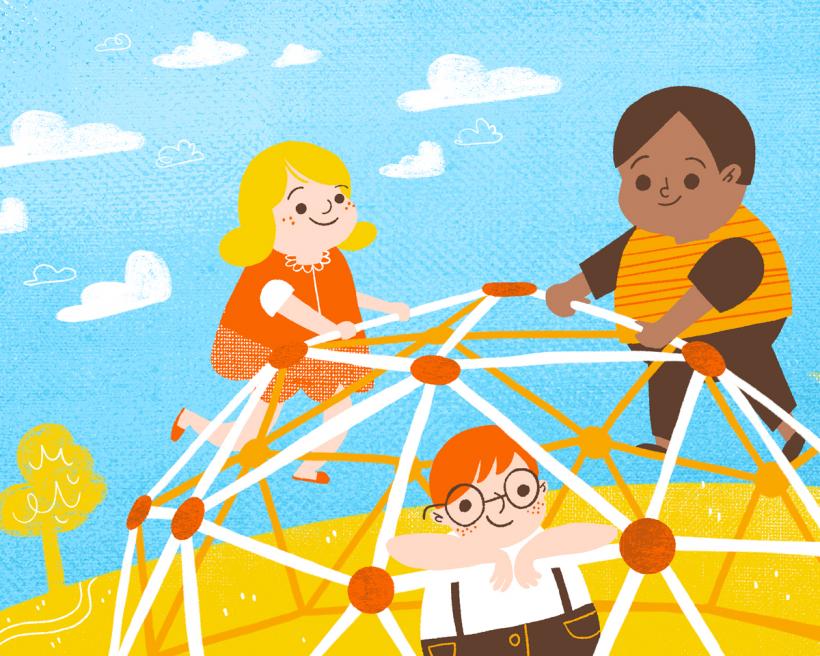
art by Julia Green
I have five children. At birth, they weighed anywhere from 7.5 to almost 11 pounds. They all breastfed (some of them for a long time). They all started eating solid food somewhere around six months (give or take.) At their first birthdays, they all weighed somewhere in the neighborhood of 28-30 pounds (big kids, I know.)
That’s where things started to differentiate. I have one kid who grew inches but barely gained an ounce between age one and kindergarten. I have one kid who was the tallest kid in class by a head and right above average in weight. I have one kid that stayed in the 50th percentile for weight and height until a middle school growth-spurt shot him up to almost six feet. I have one kid whose head circumference has been off the chart since he came out of my body. And I have one kid who is off the charts in both height and weight.
This child also happens to be terrified of strangers — including medical professionals of any kind and like half our family — and unknown situations in general. So, you can imagine that going to the doctor for a physical exam is a special kind of torture for everyone involved. The last pediatrician visit we had involved me holding her 85-pound body in my arms and standing on a scale that was certainly not designed to hold the weight of a fat adult plus her kid.
Once we had survived the weighing and measuring, the doctor came in to do her physical exam and review her stats. When she started with “I only see one problem…” I knew what was coming; my child is “obese.” This is a child whose kindergarten teacher indoctrinated her into diet culture by sharing her Weight Watchers “journey” every week for the entire school year. This is a child whose own mother is in eating disorder recovery. And yes, this is a child who is undoubtedly aware that she is larger than her peers, one who does not need to hear about her weight.
BUT childhood obesity. I know. I KNOW Michelle Obama built her work as a First Lady around helping the kids of America (especially the fat ones) move more. And yes, obesity can lead to health problems. But let me tell you with how those problems are not going to be “fixed” — by telling a seven-year-old they are obese.
As a parent, I know two of the hardest things are 1. Thinking you are screwing up your kids. 2. Knowing that other people think you are screwing up your kids. I also know that having an overweight child carries the labels of “lazy” and “gluttonous” in the same way being a fat adult does. And I know, if you are both a fat person and the parent of one, that you are probably keenly aware of the way people perceive you.
This is the first time I’ve had an overweight kid, but it’s not the first time I’ve had a kid whose body or behaviors fell outside “normal,” and it’s not the first time I’ve watched “professionals” judge my parenting.
I hear your worries. I understand your fear for your kids. I know how this feels. I’m here to help.
So your kid is fat, what do you do?
1. DON’T mention their size.
This is confusing because the first “do” is actually a “don’t.” You don’t need to tell your child they are fat. I promise you A. they already know and B. it isn’t going to make them thin.
So just don’t do it.
2. Encourage them to move.
Of course, movement is important. And yes, as our lives shift to more sedentary activity we move less. TV and small screens are easy to fall into and not come out of. Don't encourage movement in the hopes that your kid will lose weight (because omg THEY ARE STILL GROWING), but because movement is important for their overall health and development.
3. Move with them.
Movement is important for all people. Not just because it improves health, but because it’s a time to connect with your body.
4. Don’t frame movement as punishment.
Help your kids (and yourself) find things to do that they enjoy. If they are terrible at ball sports (like I was, oh my gosh so terrible), for goodness sake, don’t make them play baseball. Physical activity doesn’t have to be an organized sport or even organized at all. Bike riding. Gardening. Yoga. A living room dance party.
5. Offer a variety of things to eat.
We know restricting diet doesn’t work. Taking away sweets or the things that we perceive as “bad” doesn’t make them less appealing. Dessert is fine.
Also, kids are better at knowing what they need than you think. Teaching our kids to listen to their bodies' cues will empower them to make the best choices for themselves, both now and into adulthood.
6. Stop labeling foods as "good" or "bad."
Let's not pass on the same bullshit baggage about food morality. Food = calories. Calories = energy. Energy = required for body function. That's easy math.
7. Instead, talk about the importance of food as fuel.
We like to talk about food like it's gasoline for a car. There are different kinds of food just like there are diffferent kinds of fuel. Carbohydrates (like bread, rice, things with sugar) give you quick fuel for fast energy. Fats (like nuts and oils) give you long-lasting fuel to keep you going all day. Proteins (like meats, cheeses, eggs) are important for maintaining your body (like oil changes, if your kids are obsessed with cars like mine.)
Focusing on how each food makes us feel is a far better way to talk about the kind of foods we eat. Kids are more perceptive to the changes in their bodies than we give them credit for.
What our kids, all our kids (the fat ones, the thin ones, the neurotypical ones, the neurodiverse ones) need is uncondtional love and support. They need to know that they are valued regardless of their body size or shape. It's not just for them. It's for the future.
As always, keep talking, keep laughing, keep hugging. The manual your kids didn’t come with is inside you.
Related:







![Photo By Dr. François S. Clemmons [CC BY-SA 4.0 (https://creativecommons.org/licenses/by-sa/4.0)], from Wikimedia Commons](/sites/default/files/styles/profile/public/images/article/2019-06/Mr.%2520Rogers%2520%25281%2529.png?itok=LLdrwTAP)